Listen:
Check out all episodes on the My Favorite Mistake main page.
My guest for Episode #296 of the My Favorite Mistake podcast is Sherianna Boyle, a renowned psychic healer, speaker, and founder of Emotional Detox Coaching® and The Cleanse Method®. She has written over ten books, including the best-selling Energy in Action: The Power of Emotions & Intuition to Cultivate Peace & Freedom.
Her latest book is Just Ask Spirit: Free Your Emotions to Energize Intuition and Discover Purpose.
With over 25 years of experience in mental health and wellness, Sherianna integrates psychology, energy healing, and spirituality in her work. Her “Just Ask Spirit” podcast is in the top 5% globally, and she has been featured in major media outlets like Psychology Today, Yoga Journal, and Prevention.
In today's episode, we explored the idea that mistakes, particularly those born of brutal honesty, are vital opportunities for growth. Sherianna shared that her favorite mistake was being so candid—delivering feedback that wasn’t always received well—that she later recognized as a catalyst for learning and deeper self-awareness. She explained how that raw honesty, while sometimes painful in the moment, ultimately taught her the importance of embracing and processing emotions rather than suppressing them. By owning her truth and inviting forgiveness—from herself and others—she discovered that these so-called mistakes could pave the way for more authentic, supportive relationships and a greater alignment with her inner guidance.
Questions and Topics:
- What is your favorite mistake, and why does it stand out?
- Can you share a specific story that illustrates this pattern of brutal honesty?
- Reflecting on those experiences, would you do anything differently in similar situations?
- Can someone be prepared—or “braced”—for the impact of brutal honesty?
- What advice do you have for those struggling with the aftermath of a mistake?
- How can someone uncover the root of their emotional triggers, and what resources would you recommend?
- In your work, how do you define “spirit” and its role in emotional healing?
- Who is the ideal audience for your book, and in what situations would it be most helpful?
Scroll down to find:
- Video version of the episode
- How to subscribe
- Quotes
- Full transcript
Find Sherianna on social media:
Video of the Episode:
Quotes:
Click on an image for a larger view
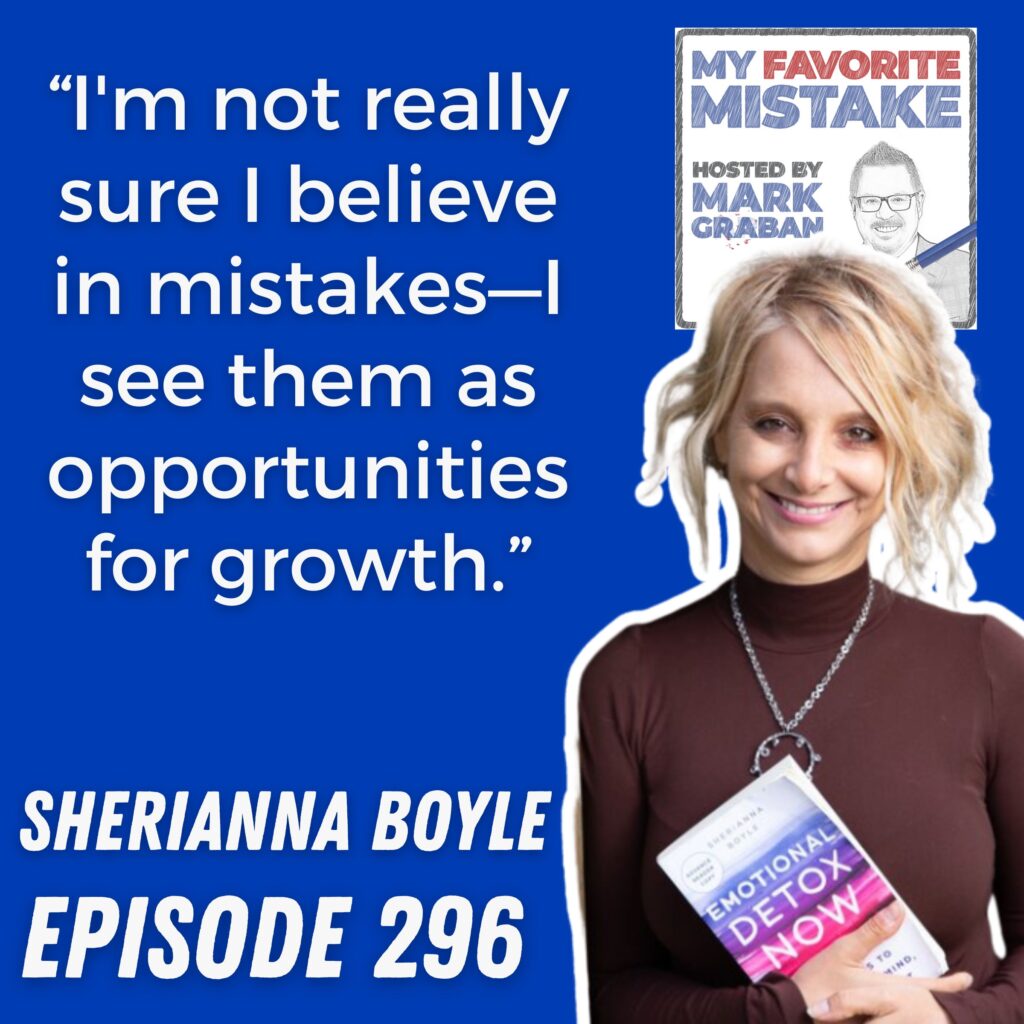
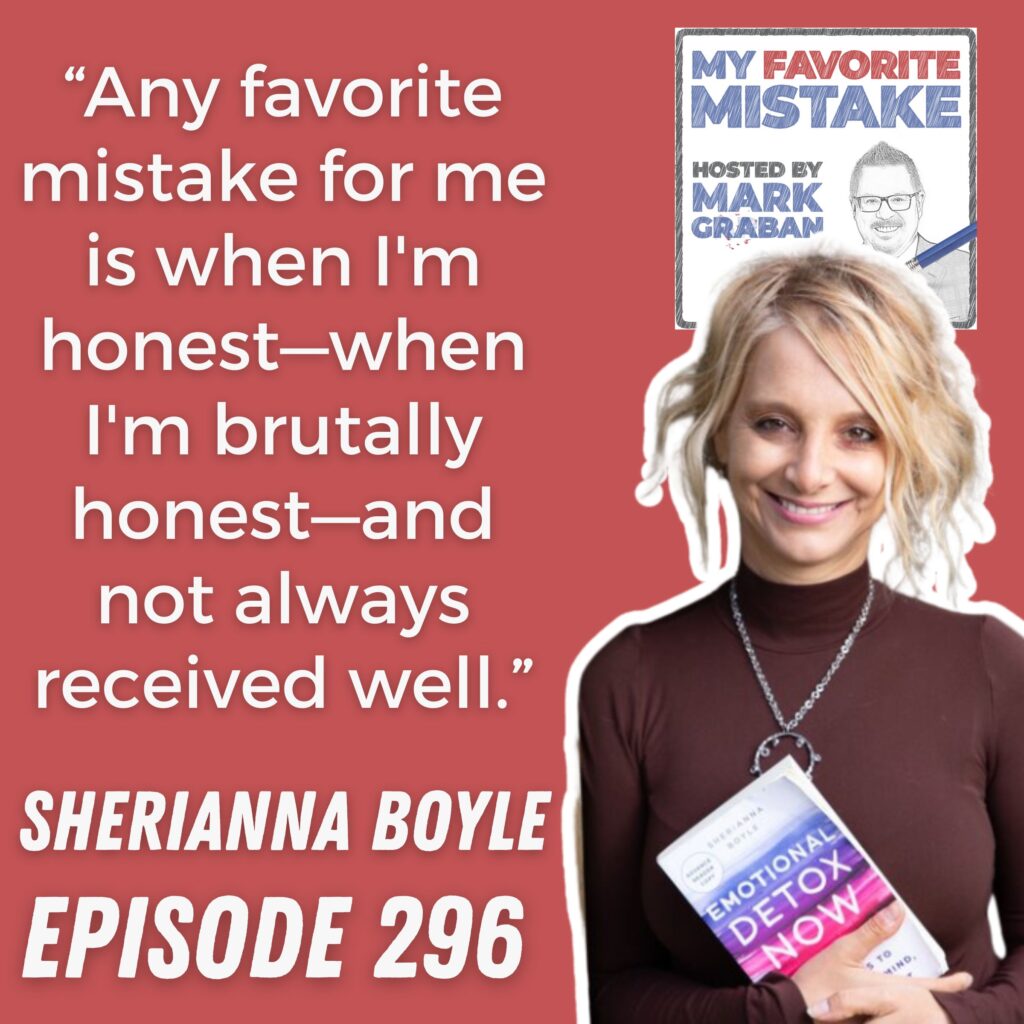
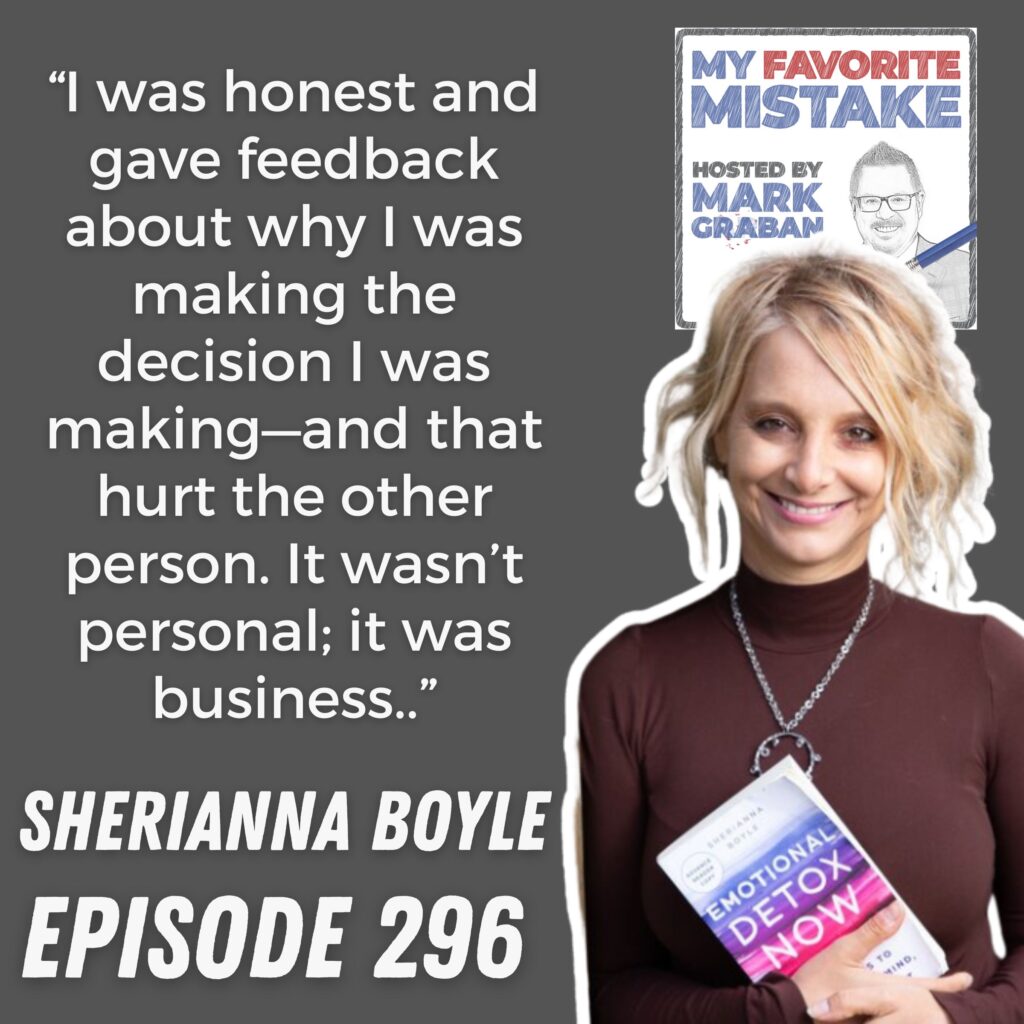
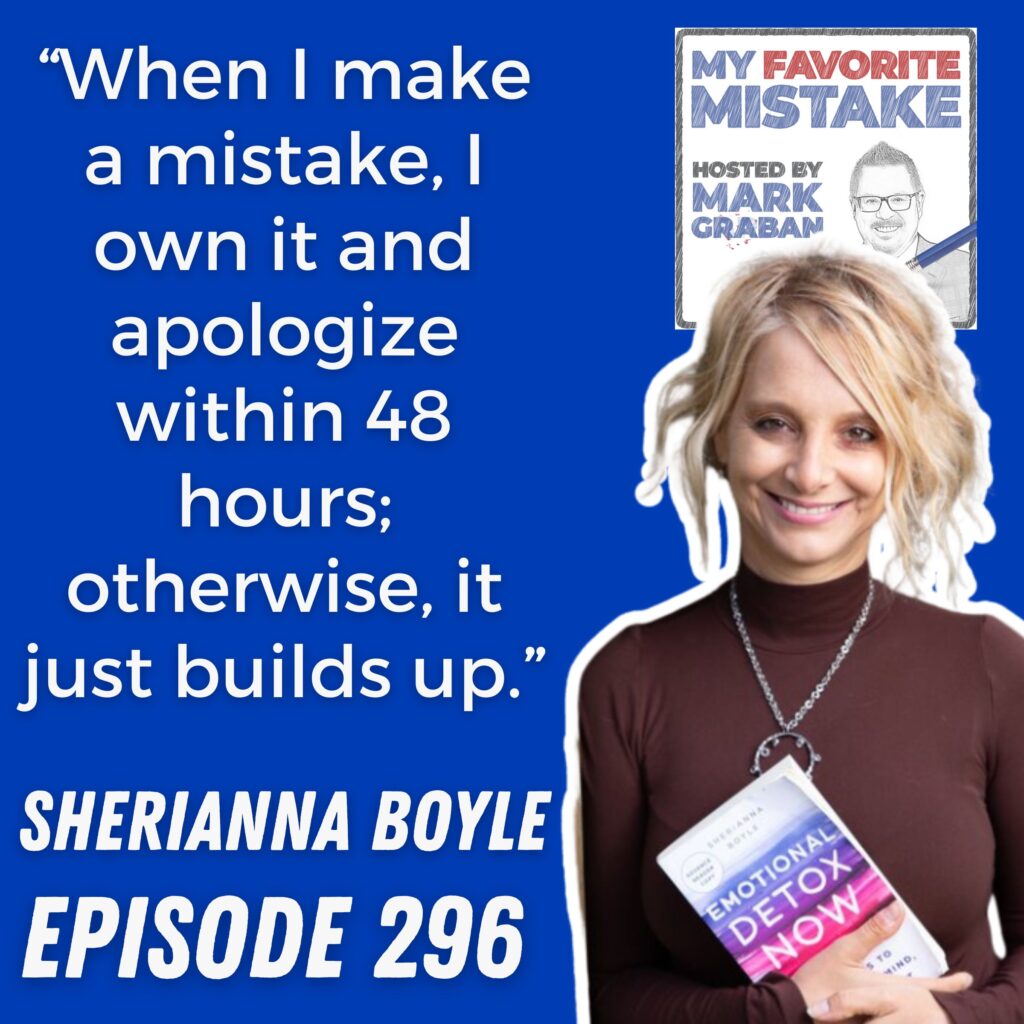
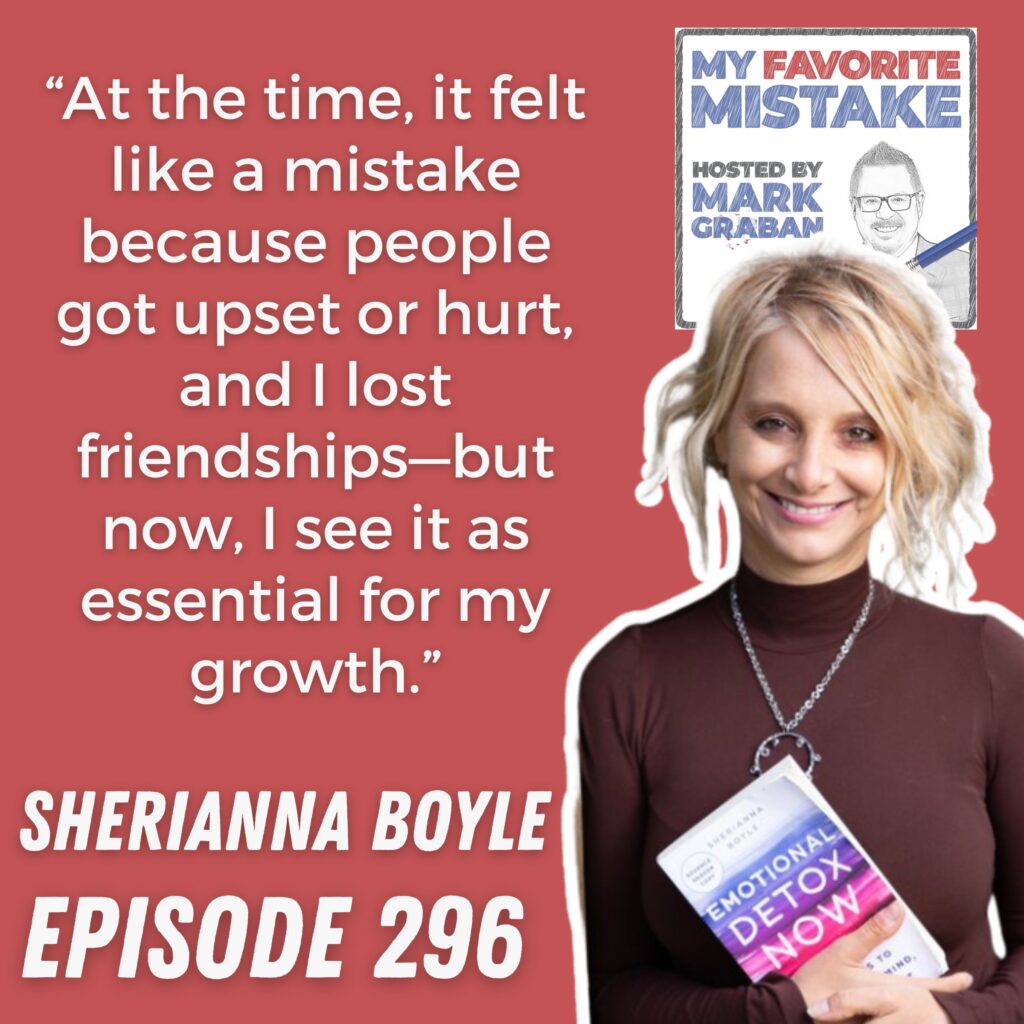
Subscribe, Follow, Support, Rate, and Review!
Please follow, rate, and review via Apple Podcasts, Podchaser, or your favorite app — that helps others find this content, and you'll be sure to get future episodes as they are released weekly. You can also financially support the show through Spotify.
You can now sign up to get new episodes via email, to make sure you don't miss a single conversation.
This podcast is part of the Lean Communicators network.

Other Ways to Subscribe or Follow — Apps & Email
3 Actionable Takeaways from the Episode
1. Embrace Imperfection as Growth Opportunities
Sherianna Boyle discusses how what initially feels like a mistake can be seen as essential for personal growth. Listeners are encouraged to reframe mistakes as opportunities for learning and development. She mentions, “I think there are opportunities for growth if you treat them in that way.”
2. Practice Emotional Processing for Higher Vibrational Living
Sherianna emphasizes the importance of acknowledging and processing emotions to raise our vibration and connect with spirit. She explains, “The way to raise our vibration is we have to process our emotions. We can't minimize, block, shove them away, pretend, you know, pretend that we don't have them.” By embracing our emotions, we open ourselves to higher levels of understanding and connection.
3. Use Honest Communication (But Proceed with Caution)
Both Mark Graban and Sherianna highlight the importance of being honest in communication but also note it can sometimes lead to uncomfortable outcomes. Sherianna shares, “I do own it and I do apologize,” within 48 hours if she realizes a conversation may have been too harsh. It's vital to balance honesty with empathy, ensuring constructive dialogue while maintaining relationships.
Automated Transcript (May Contain Mistakes)
Mark Graban:
Hi, welcome to My Favorite Mistake. I'm your host, Mark Graban, and our guest today is Sherianna Boyle. She is a renowned psychic healer, speaker, and the founder of Emotional Detox Coaching and the Cleanse Method. Sherianna is the author of 11 books—including the bestselling Energy in Action: The Power of Emotions and Intuition to Cultivate Peace and Freedom. With more than 25 years of experience in mental health and wellness, she integrates psychology, energy, healing, and spirituality in her work. Her podcast, Just Ask Spirit, is in the top 5% globally, and she has been featured in major media outlets like Psychology Today, Yoga Journal, and Prevention. So, Sherianna, welcome to the podcast. How are you?
Sherianna Boyle:
I'm great, thank you. Thanks for having me.
Mark Graban:
Yeah, it's great to have you here. We'll talk about your work and your books later on. Upcoming book, same name as the podcast Just Ask Spirit, right?
Sherianna Boyle:
That's right. Yep.
Mark Graban:
So that's in pre-order status.
Sherianna Boyle:
Pre-order status. Yeah.
Mark Graban:
As we're recording this here on October 22nd, do you have a release date for the new book yet?
Sherianna Boyle:
It's sometime in January, toward the end of the month, and if they go to justasspiritbook.com, they can get a free gift for pre-ordering the book there.
Mark Graban:
Okay. Okay. So before we come back to that topic of your books and your work, we're going to start the way we normally do here. Sherianna, with everything you've done in your career, what would you say is your favorite mistake?
Sherianna Boyle:
I love that question, and I particularly love that the word “favorite” stands out. Any favorite mistake for me is when I'm honest—when I'm brutally honest—and not always received well. It takes courage to be transparent; it takes courage to speak your truth. Sometimes, at the time, it felt like a mistake—like maybe I shouldn’t have said it, or maybe I should have said something different—because we don’t have control over how someone receives our honesty. At the moment, it felt like a mistake because people might get upset or hurt, and I’ve lost friendships that way by being honest about my feelings, where I am at, or setting boundaries to slow down the pace of some things. But now I realize that I learned so much from it. It was essential for my growth, and I’m not really sure I even believe in mistakes—I see them as opportunities for growth.
Mark Graban:
Well, I think maybe digging a little bit into what a mistake is—one dictionary definition I fall back on is taking an action, like saying something we thought was the right thing to do, and then later thinking, “Oh, that wasn’t right.” We can reflect on that without beating ourselves up or shaming ourselves, because none of us are perfect; we all make mistakes. I’m curious to hear more about your reflection on this: in one example or maybe others, you thought it was a mistake, but then came to view it differently.
Sherianna Boyle:
Yeah.
Mark Graban:
And you know, sometimes it's not just what you said but how you said it—because you can’t control how others react.
Sherianna Boyle:
No, you can’t. And I think also, and this is something people can relate to, is that a lot of people don’t talk face-to-face anymore. One thing to learn is not to have those harder conversations over email, because they often don’t go well; those more tender conversations require a different approach. The challenge is that not everybody’s up for that. You might say, “Okay, I need to have this conversation,” but the person on the other side might try to handle it via email. It’s a two-way street—oops, sorry about that. My daughter’s coming in.
Mark Graban:
Special guest!
Sherianna Boyle:
Okay.
Mark Graban:
She blurred in. She was a blur.
Sherianna Boyle:
Anyway, I think there’s so much to learn, but at the same time, we have to cut ourselves some slack. We do the best we can in situations that can be emotional and intense, and we’re not in control of how things are received. I also believe that sometimes not all relationships are meant to last forever. Some are short-term or shorter than others, and that’s okay—because then new relationships can come in.
Mark Graban:
Yeah. And you bring up an interesting point about the mode of communication. It could be a mistake to text someone when it should have been a phone call. I’ve made the mistake of sending an email when it should have been a phone call because there’s nuance that’s lost. With a phone call, you get real-time feedback, and even though you might lose some body language on Zoom, it’s still more effective than an email. It’s a mistake not just in what we communicate, but how we do it.
Sherianna Boyle:
Right, exactly. The delivery, the methodology. But again, I think we do the best we can. Sometimes, business relationships happen with people who live across the country or in other states, and you work with what you have. The thing about me is I don’t hold grudges—I know how to forgive. I consider forgiveness, whether for myself or others, one of my strengths. I’m pretty good at forgiving right away and at owning my part. I recognize that I play a role, and not everyone is good at that.
Mark Graban:
Yeah.
Sherianna Boyle:
And when the other side isn’t good at that—when some people just hold on—it feels like they’re holding on to the mistake. But is it that they’re holding on, or is it that they just haven’t forgiven? For me, it feels like we could just forgive each other, love each other, move on, and learn from the experience. When I make a mistake, I own it and apologize—usually within 48 hours, because if I wait any longer, it just builds up.
Mark Graban:
Yeah.
Sherianna Boyle:
You start carrying things, and it builds intensity. And it has to be genuine—not a fake apology, but a true, real apology. I don’t like to hurt anyone or come across in a way that’s hurtful. But not everybody knows how to let things go and forgive. It compounds, making it seem like a really big mistake when, in essence, you could still talk.
Mark Graban:
Yeah, well. And I think if we reflect on an interaction—when you use the phrase “brutally honest,” it implies that it might be about what you said or how you delivered it. Some people don’t like being disagreed with, and that might have nothing to do with what was actually said. It depends on the situation, and sometimes a specific story makes it easier to reflect on whether there’s something you’d do differently in the future.
Sherianna Boyle:
Probably not. Yeah, probably not. The honesty wasn’t meant to be hurtful. When someone asks me, “Be honest with me,” it’s almost a setup. For me, it turned into a setup because I was honest and gave feedback on why I was making the decision I was making—and that hurt the other person. So again, I was honest because they asked. It wasn’t personal—it was business. And I sometimes think that in business, women might have a harder time with this. I wonder if, had it been two men, it might have felt a bit different—not that men don’t get hurt, but it just seems different sometimes.
Mark Graban:
Well, it could be for different reasons. It’s not even so much that they’re sensitive, but that they don’t like being disagreed with or told they’re wrong—they can’t handle that, or maybe they have that personality.
Sherianna Boyle:
Yeah, perhaps it’s not a gender thing. Who knows?
Mark Graban:
Yeah, I don’t know. I have no expertise in generalizations about men. But maybe one more question: considering the mistake you shared—can someone be prepared or “braced” for brutal honesty? It seems so situational. When someone says, “Give me honest feedback,” you might say, “Brace yourself,” or something similar. But maybe that doesn’t matter; it depends on the person and your relationship with them, or their assumption that they can handle honest feedback. Perhaps that assumption itself was a mistake.
Sherianna Boyle:
Yeah, I mean, again, it’s business—it’s nothing personal. If you ask me to be honest and you want it, I interpret that as you wanting feedback so you can grow and learn. I get feedback all the time from clients or people I work with asking, “Can I give you a suggestion? Can I give you some feedback?” It would have been great if—whatever it is—I can’t think of a specific example off the top of my head, but people have definitely asked. Asking first is a good communication skill, “May I give you honest feedback?” In this case, they did ask, but it was more casual. I think they were already in their head; I don’t think I could have said anything differently because they had already made up their minds, assuming they were reading my mind or had already spun their own stories. I was just a little late to the game.
Mark Graban:
Yeah, well, our guest today, Sherianna Boyle, has written a number of books, and I want to ask about some of the work and terminology you use—whether it’s related to any of the stories you mentioned. First off, the idea of emotional detox coaching and processing emotions—what advice would you have for others struggling with the aftermath of a mistake, given the intense emotions involved?
Sherianna Boyle:
I think the word “mistake” can be a bit triggering, quite frankly. To be honest, I believe that with emotional detox, we’re not getting rid of emotions—we’re getting to them. It’s about really understanding the difference between a reaction and a true emotion. True emotion calms us down, while reacting pulls us apart. Triggers are often unconscious. Sometimes something in someone else sets off a trigger—maybe I already had an insecurity or a past memory that made me feel unworthy. I don’t cause the trigger; I’m just a mirror for that person’s trigger, and vice versa. When we get triggered, it shows us that there’s something unhealed inside—an emotional wound. What we’re detoxing is the reaction itself. Whether it’s a reaction to something said, yelling, or even blocking someone on social media, it’s that reaction we clear through emotional detox. That process allows us to access the underlying emotion—often sadness or grief—that we might have been carrying for a long time, sometimes without even knowing the original source. Sometimes it’s genetic—there’s even epigenetics, where emotions can be inherited. We clear the reactions so we can access the true feeling, which is what connects and heals us. Feeling is the healing, the connection, the awareness, the deeper understanding, the empathy, and the compassion. But you can’t reach those higher-level emotions if you’re stuck in reactivity.
Mark Graban:
So, do I hear you right that sometimes we might not be able to pinpoint the source of that emotional wound, and it could even be genetic, going back to epigenetics?
Sherianna Boyle:
Exactly. We can carry it with us—we might say, “Oh, I feel like my mom or my dad,” and see patterns emerging. You notice these wounding patterns, such as a victim consciousness. I’ve seen many people feel like victims, and that sometimes goes back further than we know.
Mark Graban:
And can that be explored by talking with a counselor, a therapist, or even with your parents, if they’re still alive, to try to understand? If someone is trying to figure out the root of that, what resources or approaches would you recommend?
Sherianna Boyle:
Well, one approach is an emotional detox. I provide the cleanse in my work, and that’s what really helped me because I wrote about it. I wrote the book during a time of emotional trauma—I hadn’t intended to write a book on emotional detox because I was in the middle of it. I told my publisher, “I can’t write this book; I’m going through it right now,” but they said, “You’re going to write this book. Just take your time.” So, it became a journey of healing for me as I was writing it. I was also channeling—I channel spiritual spirit—and spirit gave me the steps for the cleanse. So, yes, you can talk to a therapist; there are many avenues. Energy healing is what I do—I work with emotional cleansing, energy healing, and awareness using the process I created in my books. I also help people connect to spirit and tune into their inner guidance because I find that spirit is extremely wise and helps us get to the root of things. Sometimes, with talk therapy, you can circle around the issue without really landing on it. That’s why I love working with and teaching about spirit—it offers clear, direct information.
Mark Graban:
Yeah.
Sherianna Boyle:
I always emphasize awareness and the willingness to start talking about what’s inside, even if it’s just hearing someone else’s story. That’s why I love podcasting; sometimes you hear me speak, and you realize you’re carrying something you weren’t even aware of. That realization is the beginning of growth and healing.
Mark Graban:
And when you say “spirit,” especially in the context of your podcast and the book title Just Ask Spirit, can you explain a little more about what that word means? It’s not about asking a spirit—or is it? How do you define it?
Sherianna Boyle:
It’s broad. Spirit is consciousness, awareness, energy—and when you connect to energy and consciousness, you can connect to spiritual realms and spiritual guides. What Just Ask Spirit is all about is that when I block my emotions, I also block my connection to spirit. When I process my emotions, I open myself to spirit. It’s very similar to emotional detox. In fact, there are three books in that series. Emotional Detox teaches you how to process your emotions, and Just Ask Spirit takes it to the next level by helping you process your emotions and connect to spirit simultaneously. It’s an invitation for support. I teach psychology at a college, and just last week I asked my students, “How do you solve problems?” They had to unpack it until we realized that many feel unsupported. Two of my 33 students said, “I have support in spirit.” Not one mentioned a person—it was all about asking your spirit guides. It’s not conventional thinking, but it works.
Mark Graban:
I don’t know—yeah, that’s why I’m curious about it.
Sherianna Boyle:
Nobody thinks like that initially. Yet it’s abundant and powerful. For instance, one client texted me today because something happened at work, and I said, “Let’s connect to spirit first.” She’s learning that there’s more guidance and support there. That progress shows when someone becomes fully aware and checks with their spiritual team before making a decision.
Mark Graban:
So, tell us a little bit more about the book. Who is this book ideal for? What kinds of situations might people be struggling with where this book would be most helpful?
Sherianna Boyle:
It’s for anyone interested in self-help, mental health, and spirituality—especially if they’re looking for a spiritual twist to their mental health self-care. It’s for those seeking something a little different from traditional talk therapy. I always say it’s in addition to self-exploration. The book is written as if you’re new to the process—I guide you through the steps of connecting and processing your emotions. My motto for the book is “Feel first, then ask.” If you don’t feel first, you’re asking spirit from a state of reactivity, which makes it difficult to truly connect and receive guidance. I’ve had clients who felt that despite asking the angels or their guides, nothing happened—they were in a state of reactivity, not processing their emotions. We have a responsibility to show up in the highest vibrational state possible, because spirit runs at a very high vibrational consciousness. We must raise our vibration by processing our emotions rather than minimizing or blocking them.
Mark Graban:
Right.
Sherianna Boyle:
That’s the best way to raise your vibration.
Mark Graban:
Yeah. And I’m hearing you say that processing emotions means first acknowledging them—recognizing that our emotions are what they are, rather than trying to stifle them or live an emotion-free life, which isn’t healthy.
Sherianna Boyle:
Exactly. We are spirit, and while we connect to spirit, we are spirit. Emotions, like spirit, have anatomy, frequency, and movement—they’re abundant and infinite. They help create movement, connection, evolution, and learning. We can’t grow without experiencing disappointment or hurt. However, if we stay stuck in those emotions, we miss the lessons. Many ascended masters—Jesus, Buddha, and others—taught us about forgiveness, love, and connection. They advised us to take things lightly, let go, and not sit in shame. But there’s a process, and they provided spiritual tools to help us. That’s what the book contains: the cleanse I created in the Emotional Detox series, my signature method, which I sometimes present from different angles as you grow. And you can start wherever you’re comfortable, because each book is written as if you’re new to the process.
Mark Graban:
Yeah, and it is a process, right?
Sherianna Boyle:
Oh, yeah.
Mark Graban:
There’s no quick fix, right?
Sherianna Boyle:
Not a quick fix.
Mark Graban:
No, it's a mistake to expect that. But again, our guest today has been Sherianna Boyle. I will make sure there are links in the show notes to her website, podcast, and her most recent book. The new book and the podcast are both called Just Ask Spirit. There are lots of other books, so I hope people will check out the different services and coaching Sherianna provides. Thank you for being a guest today. These topics are sometimes a struggle for me because they aren’t part of my normal vocabulary, but you’ve given us mistake makers plenty to reflect on. Thank you for that, and I hope I was a good guide through this conversation.
Sherianna Boyle:
Absolutely. Your invitation allowed me to be on the show, and it gives everybody a voice to share their learnings. I have a retreat coming up in January—a weekend Just Spirit retreat—if anyone wants to attend. So, okay.
Mark Graban:
Well, thank you, Sherianna, for being a guest today. It’s been great meeting you through this conversation. Thank you.

